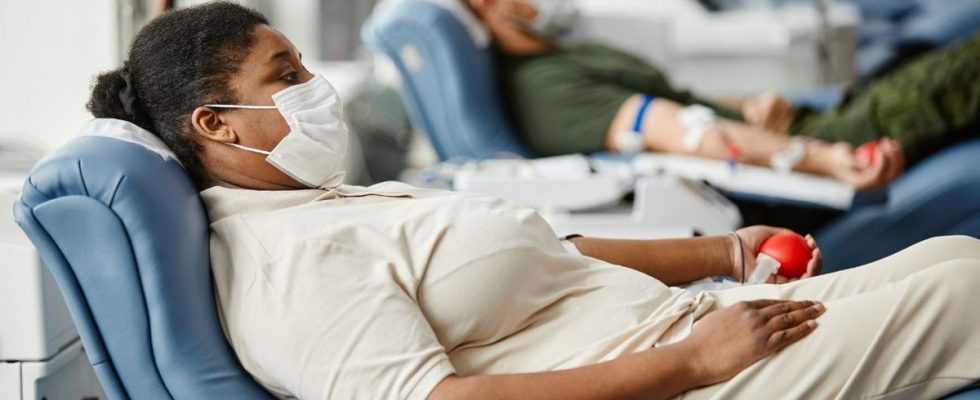People of Afro-Caribbean origins on campaign posters, partnerships with neighborhood stakeholders, discussions with religious representatives… The French Blood Establishment (EFS) is working hard to encourage people of all origins to donate blood .
For the third year in a row, the EFS is launching a new edition of its rare blood group awareness week this Monday. The goal: to increase the diversity of donors and collect “rare blood” to transfuse patients with a specific blood group. In France, according to the EFS, 700,000 to one million people carry rare blood groups, and those from sub-Saharan Africa, Martinique, Guadeloupe, Guyana, Réunion or Mayotte are particularly affected. . For what ? We will explain everything to you.
Nearly 390 more or less rare blood groups
If the general public knows the blood groups A, B, AB, O and rhesus + and –, they actually go much further. “Today there are more than 390 different blood groups,” explains Jacques Chiaroni, professor of hematology and director of EFS Paca-Corse. A person thus has several markers, and can therefore be both A, rhesus positive and Vel positive, for example.
“Among these nearly 400 markers, around half are possessed by almost the entire general population,” adds Thierry Peyrard, director of the national reference department in immuno-hematology and rare blood at the EFS. But nearly 250 are considered rare. For example, 99.96% of the population is Vel positive while only one person in 2,500 is Vel negative. » And this is important, because a patient transfused with incompatible blood could see his life compromised, even after a single transfusion.
A “geography of blood groups”
Among these blood groups, some are common in certain populations and rare in others. A true “geography of blood groups”. “If one of them is common in a population and the latter moves to another area to settle there and does not donate blood, there is a risk of transfusion blockage,” continues Jacques Chiaroni. Me, for example, I am rhesus negative and if I go to China, I cannot be transfused because rhesus negative almost does not exist. » Consequence: people with “rare blood” who need to be transfused cannot be properly treated. And this can cause inequalities in access to transfusion depending on its origin.
This brings us back to the EFS campaign aimed at people with rare blood groups, including those of African origin. “The negative U, for example, is rare and sought after in France,” underlines Thierry Peyrard. In eighteen years, I have met only one person of European origin U negative, while among those of African origin, 2% have this blood group, and this figure rises to 11% if we approach the equatorial zone. »
This greater genetic diversity can be explained historically. “Modern man having arrived in Africa 250,000 years ago, the African population is much older than other populations in the world,” recalls the professor of hematology. And the older a population is, the more genetic diversity it has, which is the case in Africa. »
More affected by sickle cell disease
If the EFS seeks to increase the diversity of donors, it is also because certain pathologies, such as sickle cell anemia, mainly affect people of African or Caribbean origin. This genetic disease, the most common in France with 30,000 patients, is characterized by a malformation of red blood cells. Much of the therapy involves regular transfusions.
The generosity (and diversity) of blood donors is therefore essential to the survival of patients, knowing that “sickle cell disease is better treated and the life expectancy of patients is much longer than around twenty years ago,” adds the epidemiologist. More transfusions are therefore needed.
Cultural and religious reluctance
The lack of diversity in donations can also be explained by cultural and religious reluctance, according to Jacques Chiaroni. “It is particularly linked to a bad interpretation of religion, particularly Muslim. I worked a lot with Comorians from Marseille who thought their religion forbade them from donating blood. » The director of the local EFS therefore worked hand in hand with imams and Koranic school teachers to remove doubts and facilitate donations.
But according to Thierry Peyrard, the problem arises less and less. “Things are moving. More and more young people of African and Caribbean origin are becoming regular donors. In Guadeloupe and Martinique, donors are doing remarkable work to meet the needs of mainland France. »
Unlike other bags, those of people with a rare blood group are found, unless there is an immediate need, in the National Rare Blood Bank. Located in the Paris suburbs, it brings together nearly 8,400 frozen bags which can be used for thirty years.

